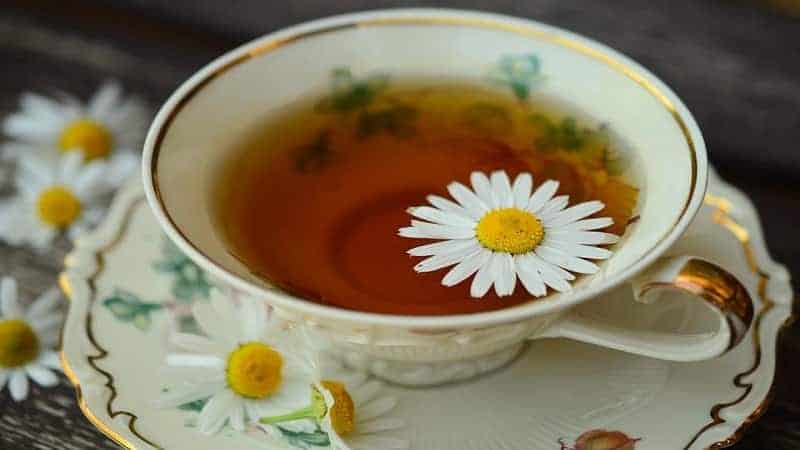Headache is not a new term; many people experience it in their daily lives. With tension headaches, pain may be moderate (or milder), and both sides of the brain may be affected. With migraines, pain tends to be more severe, but just one side of the brain is affected.
In addition to these, there are many other kinds of headaches.
If your head is aching, you may be looking for a safe and effective alternative to medication. Herbal teas for headaches might help. You will have to try them out to test their efficacy.
Here are herbal teas for headaches, along with some scientific studies.

Ginger Tea
ASIN: B002XWSNCA
Ginger is a commonly used spice in all sorts of cuisines. Thanks to its health benefits, it also finds use in folk remedies.
Since it has powerful antioxidants, it can reduce inflammation. This might be helpful since inflammation is a key factor behind headaches.
According to a study from 2014, the ginger powder was found to be nearly as effective as sumatriptan for migraine treatment. Sumatriptan is a medication commonly used for treating migraines.
Ginger is relatively safe to use. Hence, you can take ginger tea without too many concerns if you don’t have any major underlying health problems.
In case you are on blood thinners or have a gallbladder issue, you should first consult your doctor before trying out ginger tea.
Peppermint Tea
ASIN: B009L6Q2YW
The National Institutes of Health explains that the topical application of peppermint to your forehead might help with tension headaches.
Peppermint oil may be more powerful compared to peppermint tea. However, peppermint tea may still be beneficial as certain animal studies show that peppermint tea can help relieve pain.
Peppermint tea has a good reputation for safety. Most people can safely consume peppermint tea since it does not have side effects.
Willow Bark Tea
ASIN: B000PG5I4W
Willow bark is exactly what its name implies. It is the bark of various willow trees.
Willow bark is known to benefit inflammation and pain. Hence, it is an ancient remedy that is thousands of years old.
The active ingredient known as salicin is responsible for much of its benefits. Salicin bears chemical similarity to the common medication aspirin. Hence, it is also known as ‘nature’s aspirin’.
Warning: Since willow bark is close to aspirin, you should not consume it if your doctor has prevented you from taking it. Hence, people on blood thinners should not consume willow bark. Nor should pregnant and breastfeeding women. It is not suitable for children.
Clove Tea
ASIN: B0065JA1IQ
Clove grows natively in Indonesia, but due to its benefits, it is found worldwide.
Since ancient times, clove has been used to treat headaches and all kinds of pain. This may be due to the fact that clove has certain substances that can bring down pain perception in the brain.
Warning: Take note that clove has certain chemicals that can slow down the rate of healing. So if you have just undergone surgery or are on blood thinners, you should first consult your doctor before consuming clove tea.
Feverfew Tea
ASIN: B07H1Q5HGR
Feverfew tea has a rich history of medical use. This herb has been the subject of several studies investigating its migraine alleviation ability. Not only can feverfew tea reduce the intensity of migraines, but it might also help prevent them from happening.
One safety concern is that feverfew tea might lead to mouth irritation. In that case, you should reduce the number of leaves put to boil and try adding more water. Pregnant women should not drink feverfew tea since it can initiate labor.
Chamomile Tea
ASIN: B000H7K0WO
Chamomile tea finds use in herbal remedies as a treatment for anxiety and insomnia.
There is currently no research to indicate that chamomile tea treats headaches. However, since it has a noticeable soothing effect, it might reduce the pain and frequency of tension headaches.
Drinking chamomile tea might lead to allergic reactions if you are allergic to daisies, marigolds, chrysanthemums, and ragweed. Before trying chamomile tea, you should consult with your doctor, especially if you are taking antirejection drugs following an organ transplant or if you are on blood thinners.
Lime Tree Tea
Lime tree tea boasts sedative effects that could be the solution you are looking for. This kind of herbal tea has anecdotal as well as scientific evidence for combating pain. It can relax your body and thus help you to avoid tension headaches.
Sichuan Lovage
Sichuan lovage is a Chinese herbal remedy that can help with alleviating headaches. Not only can Sichuan lovage beat pain, but it also assists with blood circulation. Better circulation means that all parts of our body are getting the nutrients they need to function optimally. This can lead to headache relief.
Conventional Tea May Not be the Best Choice for Headaches
If you have recurring headaches, it might help cut out conventional tea. That’s because black tea has plenty of caffeine, just like green tea and oolong tea.
The trouble with caffeine is that it can immediately narrow down blood vessels surrounding the brain. However, these blood vessels might expand once more, leading to pain and pressure.
Also, since caffeine has a strong diuretic effect, it might also cause dehydration.
Although conventional tea has many health benefits, you may be better off using other kinds of non-caffeinated teas to treat headaches.
Our Final Thoughts
Headaches can interfere with your work and quality of life. Hence, you should try to find relatively safe treatments besides medication. Trying out the best herbal teas for headaches just might do the trick.
Even if they are not completely successful, they might reduce the incidence and pain of headaches.





















